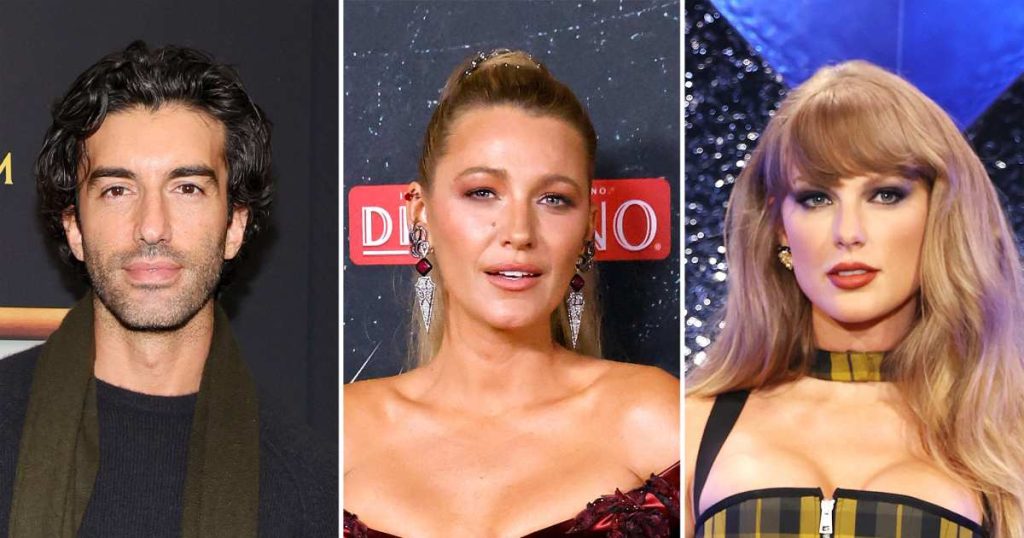Summarize this content to 2000 words in 6 paragraphs
Justin Baldoni seemingly referred to Blake Lively’s friend, Taylor Swift, in a text message conversation about It Ends With Us.
In Baldoni’s new $400 million lawsuit against Lively, 37, which was obtained by Us Weekly on Thursday, January 16, Baldoni appeared to mention Swift, 34, and Lively’s husband, Ryan Reynolds, while discussing Lively’s changes for the now infamous rooftop scene in their film It Ends With Us.
“Was working on rooftop scene today, I really love what you did. It really does hep [sic] a lot. Makes it so much more fun and interesting. (And I would have felt that way without Ryan and Taylor),” Baldoni’s texts read alongside a winking face emoji. “You really are a talent across the board. Really excited nd [sic] grateful to do this together.”
According to the lawsuit, Lively allegedly replied but did not point out Baldoni’s mention of Reynolds, 48, or Swift.
“That’s very appreciated. And means a lot. I’m deeply inspired by the films and we’re gonna make outside of the success of the book,” the actress replied per the docs. “We have such an opportunity to not surprise people who love the book but reach an even bigger audience by making an undeniably dynamic and also commercial film.”
Swift was also apparently mentioned in a text message exchange between Baldoni and an executive from Sony Entertainment, which distributed It Ends With Us. The alleged conversation claimed that Lively was reaching out to Swift to use one of her songs for the film. (Swift’s 2020 track “My Tears Ricochet” was featured in the movie’s first trailer.)
“Blake is calling Taylor to approve the song. She of course reached out saying she is asking for time with … her editor,” read an alleged message from a contact named Sony Executive No. 1. “We know it was conditional on signing contract – but asking if you’ll reconsider so … can release this trailer and Blake does not change mind re calling Taylor Swift.”
In the docs, Baldoni claimed that an unnamed “megacelebrity” got involved in his and Lively’s behind the scenes drama. Baldoni alleged that Lively sent him a draft of the rooftop scene which “dramatically differed” from the original version. Baldoni’s lawsuit claimed that he “thanked” her for “her passion” but ultimately wanted the film’s moment to be “somewhere between the original version and Lively’s version.” Lively allegedly did not respond to him for “multiple days” before texting him back.
“Of course, didn’t feel great for me. Or [another megacelebrity friend and Ryan Reynolds]. To have my passion praised instead of my specific contribution,” Lively’s alleged message wrote.
It is unclear who the celebrity friend’s identity is.
Us has reached out to Lively and Swift for comment.
Baldoni filed the new lawsuit against Lively, Reynolds and Lively’s publicist Leslie Sloane, for $400 million in damages. The filing comes after he took legal action against The New York Times for libel and false light invasion of privacy. (Lively first sued Baldoni in December, claiming he was launching a “social manipulation” campaign against her and fostered a “hostile work environment” on set. Baldoni has denied the allegations.)
“This lawsuit is a legal action based on an overwhelming amount of untampered evidence detailing Blake Lively and her team’s duplicitous attempt to destroy Justin Baldoni, his team and their respective companies by disseminating grossly edited, unsubstantiated, new and doctored information to the media,” Balondi’s attorney Bryan Freedman said in a statement to Us. “It is clear based on our own all out willingness to provide all complete text messages, emails, video footage and other documentary evidence that was shared between the parties in real time, that this is a battle she will not win and will certainly regret.”
The statement continued: “Blake Lively was either severely misled by her team or intentionally and knowingly misrepresented the truth. Ms. Lively will never again be allowed to continue to exploit actual victims of real harassment solely for her personal reputation gain at the expense of those without power. Let’s not forget, Ms. Lively and her team attempted to bulldoze reputations and livelihoods for heinously selfish reasons through their own dangerous manipulation of the media before even taking any actual legal action. We know the truth, and now the public does too. Justin and his team have nothing to hide, documents do not lie.”
Publicists affected by Lively’s lawsuit offered an additional statement.
“It is devastating that we are forced to answer this viciously selfish ongoing litigation littered with documented and provable lies in the midst of the tragedy impacting California where we reside. Five months ago Ms. Lively chose to promote a film about domestic violence in a way that caused instant negative and organic backlash due to her own highly publicized actions,” they said in a statement to Us. “Instead of accepting responsibility, she decided to cruelly blame us. This malicious attack on private individuals by Ms. Lively and her team in which they chose to spoon feed The New York Times with doctored, out of context and edited text messages in an effort to paint herself as a victim set off a chain of events that has been harmful beyond measure.”
The statement continued: “To be clear, Ms. Lively and her team initiated this smear campaign in the media for the sole intention of gaining undeserved public sympathy for her own missteps. Over the last month we have received death threats, abhorrent abuse and vile anti-semitic slurs hurled at us due to her decision to use us as scapegoats for her own choices promoting her film in which she made millions of dollars. With this filing, we lift our own curtain of what happens when the entitled weaponize power, fear and money to destroy, intimidate and bully those who get in their way.”













